Generation X: An Inconvenient Era
A data-based look at the financial context of the past 30 years from the perspective of Gen X.
Lately there has been some talk about Generation X and retirement.
“The typical Gen X couple, born between 1966 and 1975, only has enough savings to replace half of its pre-retirement earnings. Married Americans born during the first part of the baby boom, from 1946 to 1955, can expect to retire with about 82 percent of their income.” (Gen X Has New Reason to Resent Boomers as Retirement Looks Bleak).
The response from some circles has been that the net worth of GenX is half that of their parents because they’re slackers who blew the money. Really?
Setting aside how the Boomers have been the most spendthrift generation in American history, quadrupling personal household debt and doubling US Federal debt in a single lifetime, I’d like to focus on something much simpler: 6th grade math.
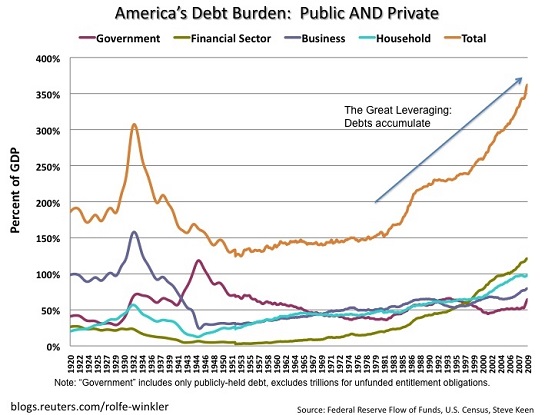
Financial people should easily recognize this chart:
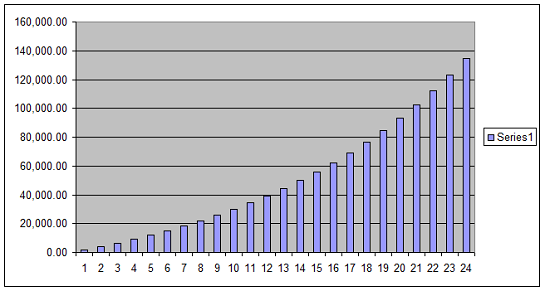
This is your standard net worth chart, starting with an income of $20,000 at age 20 and increasing income by 3% a year to a pleasant $40,000/year at age 43. This person saved a standard 10% of their income, and invested at the standard 6%/year compounded.
Standard lifetime incomes have a tendency to rise from your 20s to your 50s and level off, so your real income-generating years are strongly back-loaded. This earnings chart from Canada is pretty standard:
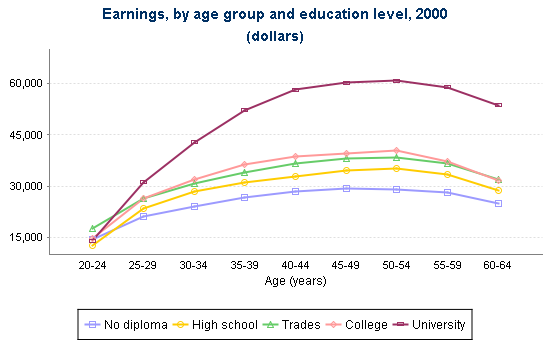
As for 6% compounding markets, this is what portfolios from 1980-2000 looked like:
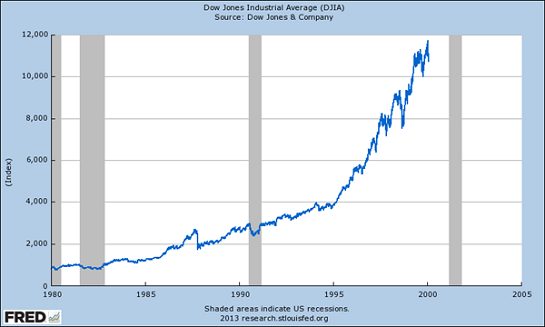
Wow, this investing stuff is easy! But we know what happened after that. The Dow has since gone sideways for a brutal 13 year Bear market:
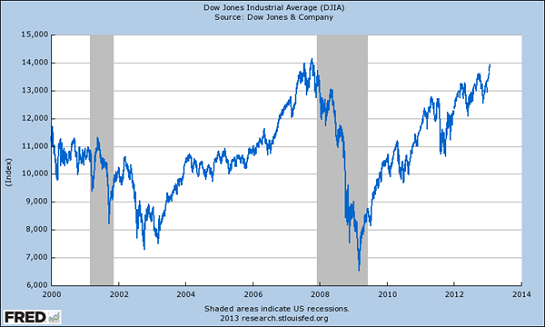
Oh well, those are the breaks. Markets tend to have a periodicity that rise for >20 years, but then reverse or at least stall in a bear market for <20 p="" years.="">
So what does this have to do with GenX?
Everything. Investing is an exponential function. One of the interesting aspects of the exponential function is that interest compounds very slowly at first, then increasing the amount contributed by interest ever-faster as time goes on. This is why Brokers are adamant about people beginning to invest when they are young: no realistic level of interest can make up for the compounding effect of time. Here is the same assumption as above—3% income rise, 10% savings with 6% compounding -- taken from age 20 to 65, halting peak income at a reasonable $55,000/year:
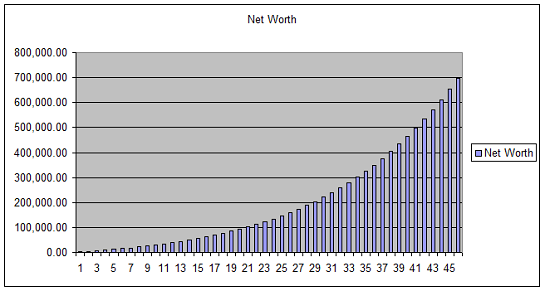
Note it takes 21 years to reach the first $100k, but only 8 to reach the $200k and 4 to reach $300k. This compounding-made-real actually happened from 1980-2000.
Here is a matrix of the 4 Generations:
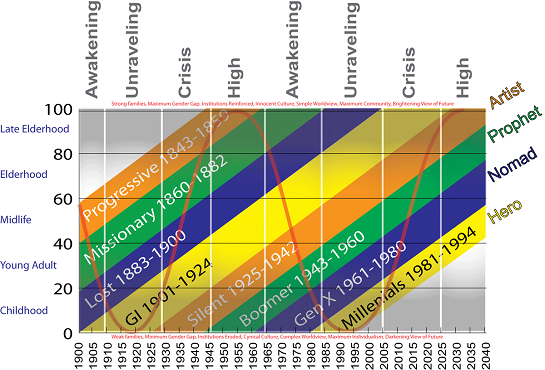
Note anything on this chart? The Boomer generation had a rough start in the bear market of the 70’s, but were only about 25 when it ended, so the Bull run coinciding with 20 of their core income years. Very nice.
Quick look to the right and you’ll see GenX. When did they come into their equivalent earning years? Year 2000, just as the market was cut in half:
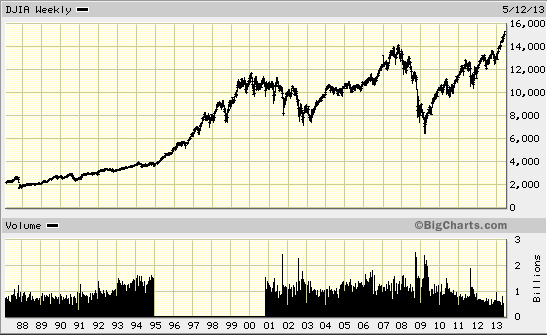
Why should that matter? The Dow has now recovered and gone to new highs of 14,000.
Well, let’s run the charts and see. Again assuming $20k starting income, 3% income growth, 10% savings, and full investment in the Dow as a proxy, let’s compare GenX income theory to reality:
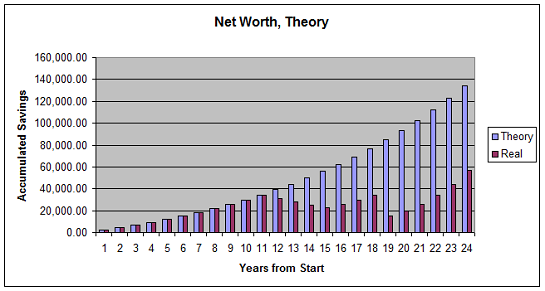
Wow! Right at the 10-year compounding point in 2000, the X-er’s market clock was re-set to zero. Then in 2008, the next 10-year compounding point, they were re-set to zero again!
Remember what we said about compounding being strongly back-loaded? The difference in 6% compounding vs the market stalling at the critical 10 year mark has cut GenX net worth in half! And if this chart was inflation-adjusted their net worth would be another 30-50% lower!
This is even assuming the massively optimistic assumption that GenX incomes are neatly rising from $20k to $55k. They’re not:
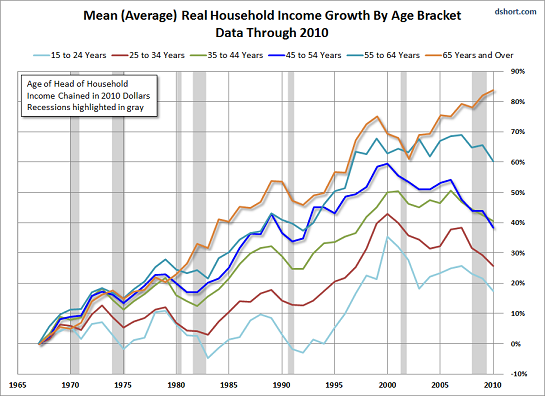
What did the Bloomberg article say again, that GenX has half the retirement savings of their parents? That reality is exactly what we predicted given the math. Anybody want to argue about how Boomers worked hard to succeed but GenX and Y are slacking wastrels? Or does math trump all?
But okay, maybe despite advertising to the contrary GenX should have known better than to trust a 19 year-old bull market. Maybe they should have gone short. If so, when? Going short in 2001, they would have to have reversed and gone long in ’03, then short in ‘08, then long in ’09, and possibly short again sometime soon? Is asking a whole generation to pick 5 exact tops and bottoms reasonable? Perhaps not. If not, where should they have put their money?
Bonds? Interest has averaged under 3% since 2000:
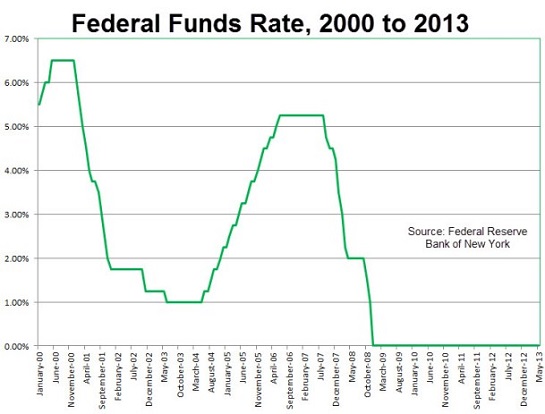
The chart of 3% vs 6% interest: a 25% difference over 10 years:
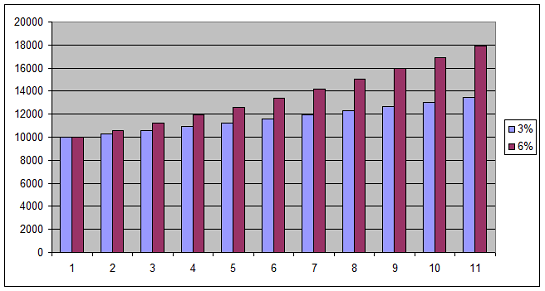
Maybe they should have invested in houses. Here’s your table of average buying ages:
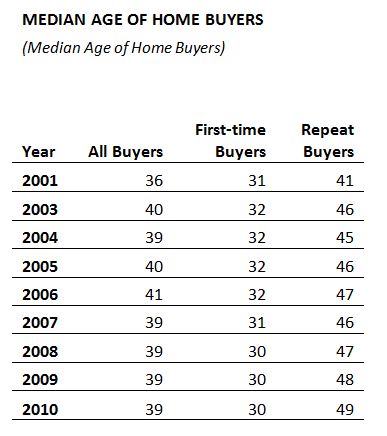
Severely burned by stocks, GenX statistically became first-time homebuyers at the age of 32, not much older than when their parents did. However, they bought their first home in 2005, not 1985. How did that work out?
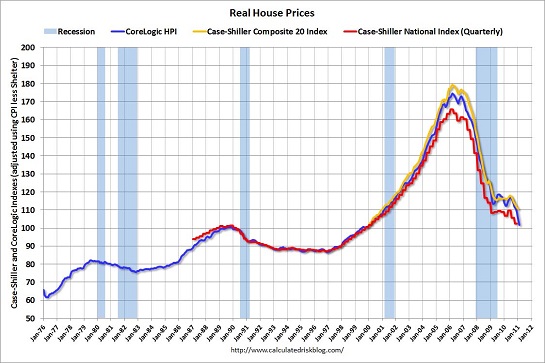
Whoops! Sorry, suckers, stole your money again: your peak home-buying years coincided with another bubble! Housing was no safe-haven. Not only that, but again, the catastrophe is not the up-front losses but the 10 years of lost compounding that can never be re-made. The math says that if GenX worked until they were 80, they will NEVER recover.
But there is only one national economy, all the same houses, same stocks, same companies: to some extent it’s not a matter of national wealth, but the DISTRIBUTION of wealth in the nation. So if GenX was systematically disenfranchised by engineered stock and housing bubbles plus low interest rates, who was their expected slice of GDP transferred to?
Again:
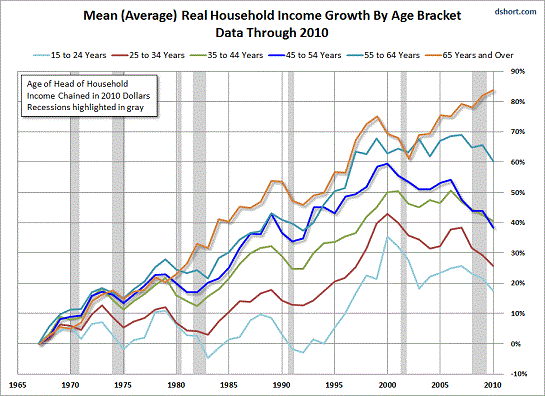
That’s right, the Boomers, in allegiance with the financial elite, engineered a transfer of all other generations’ income to themselves. This, plus being born in an expanding demographic, was the totality of their investing genius.
Why should anyone protest this observation? What do you think the decades-old phrase “the national debt has enslaved our children” means? It means that the Boomers, who were in power at that time, took all the wealth of the nation for themselves and left their children with the bill.
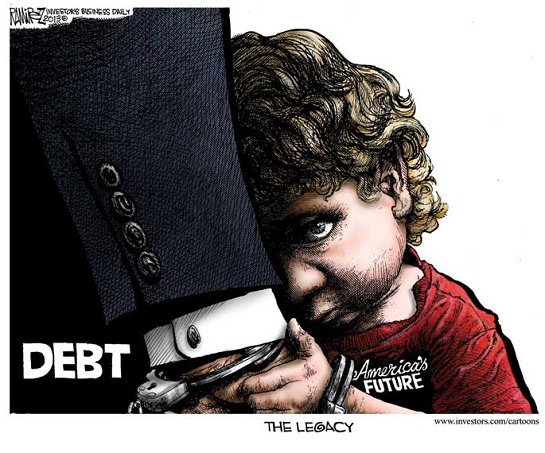
That’s not a surprise, it’s well-known fact that has been approved of by everyone in power for 20 years. I’ve been hearing it openly stated since before the National Commission on Social Security in 1983. When I was 13, my national parents said that I would pay their debts so they could get wealthy at my expense, and they have fully kept their promise. Now I am 43 and not only had the $80,000 of my net worth systematically stolen, but being unable to outvote them, have been saddled against my will with the $50,000/person of the national debt. An estimate of $130,000 per person has been transferred. From us, GenX and Y, to them. And with 10,000 Boomers a day retiring and a 1:1 worker to recipient ratio, they expect much, much more.
So think again before you so easily dismiss the 25% unemployment rate and 3rd-world incomes of Generations X and Y and start with a short lesson on the problems of exponential functions.
Yet this terrible math leaves the question of what's next? Can this unequal state of affairs remain a permanent feature of American life? Can the work of one group-- the very hours of their life--be morally claimed and transferred to another by dictate? That is to say, does one generation have the right to enslave another, whether physically with chains they never earned, or financially with debts they never accrued? And if this transfer was voted into power by a generation and enforced by government dictate, why can’t Generation X and Y vote to transfer all the Boomers’ wealth back to themselves?
We don’t know at this time, but with the Dow at all-time highs it would seem that, one way or another, incomes and prices can only revert to the mean. And brother, speaking from the bottom, it’s a long way down to here.
by Eric A.
Links:
How income varies with age
Income by age and education attainment (Canada)
generational matrix chart
Dow Jones Industrial Average historical charts
U.S. House Prices - Nominal, Real, Price-to-Rent
Median age of homebuyers chart
On a related topic: AND THE BAND PLAYED ON Jim Quinn on the Millennial Generation and the Fourth Turning.
Things are falling apart--that is obvious. But why are they falling apart? The reasons are complex and global. Our economy and society have structural problems that cannot be solved by adding debt to debt. We are becoming poorer, not just from financial over-reach, but from fundamental forces that are not easy to identify or understand. We will cover the five core reasons why things are falling apart:
 1. Debt and financialization
1. Debt and financialization2. Crony capitalism and the elimination of accountability
3. Diminishing returns
4. Centralization
5. Technological, financial and demographic changes in our economy
Complex systems weakened by diminishing returns collapse under their own weight and are replaced by systems that are simpler, faster and affordable. If we cling to the old ways, our system will disintegrate. If we want sustainable prosperity rather than collapse, we must embrace a new model that is Decentralized, Adaptive, Transparent and Accountable (DATA).
We are not powerless. Not accepting responsibility and being powerless are two sides of the same coin: once we accept responsibility, we become powerful.
Kindle edition: $9.95 print edition: $24 on Amazon.com
To receive a 20% discount on the print edition: $19.20 (retail $24), follow the link, open a Createspace account and enter discount code SJRGPLAB. (This is the only way I can offer a discount.)
| Thank you, Riley T. ($120), for your outrageously generous contribution to this site -- I am greatly honored by your steadfast support and readership. | Thank you, Matt S. ($5/month), for your most excellently generous subscription to this site -- I am greatly honored by your support and readership. |



























